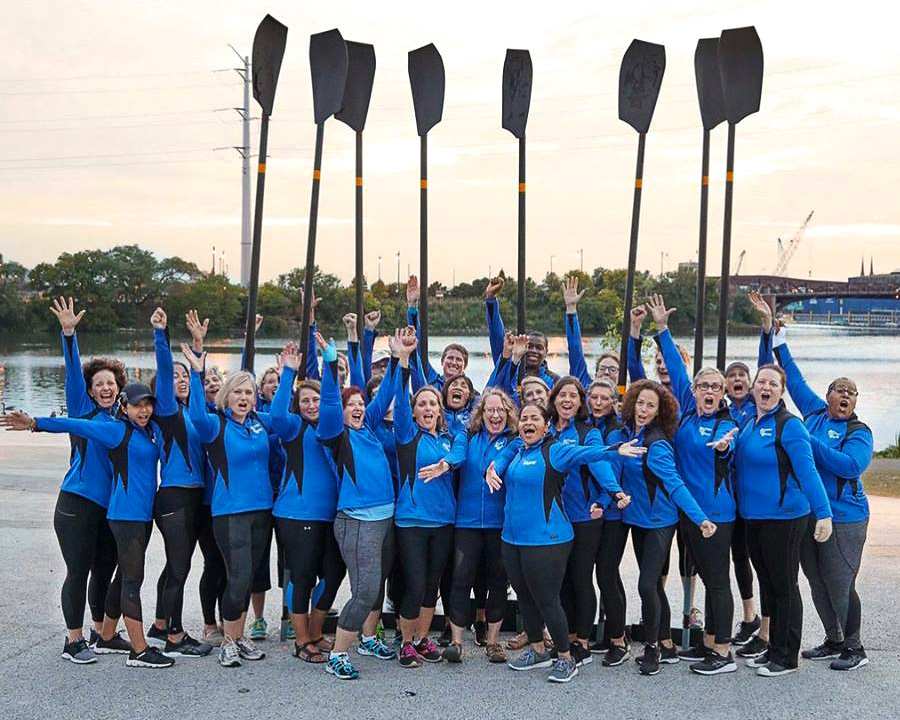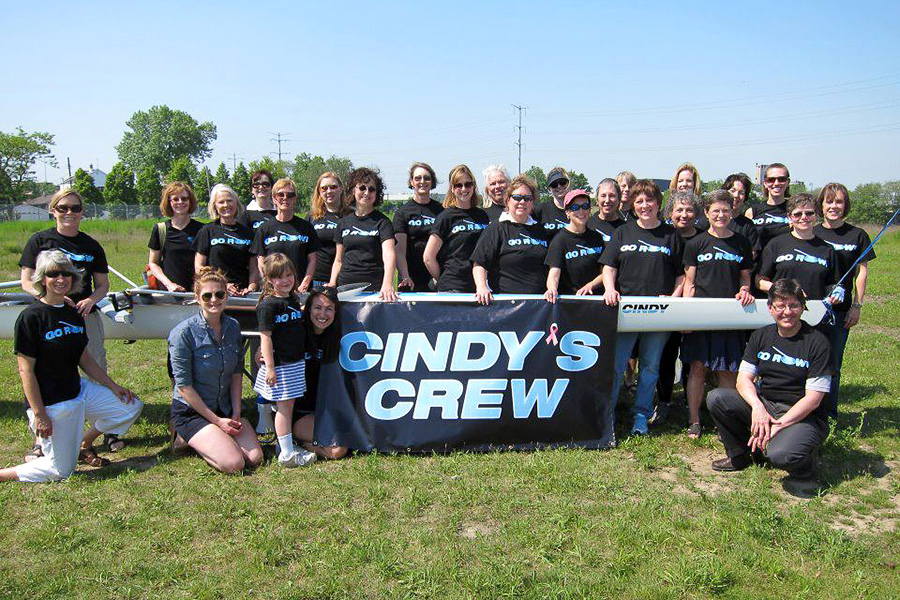Morgan Bellock opened Instagram while out to dinner with a friend last month. The posts populating her feed brought sad news. A New York–based member of The Breasties — a non-profit for young women affected by breast and reproductive cancers, for which Bellock serves as a Chicago ambassador — had died from the disease.
“I have to go home,” thought Bellock, who was diagnosed with ovarian cancer in 2017, at age 34. “I can’t be out right now.” She spent the evening texting and talking with other Breasties, crying and trying to process the passing.
The moment highlights an inherent challenge for people affected by cancer who participate in support and advocacy groups.
Such organizations can bring tremendous benefits — a safe space to share concerns, deep bonds with others who share a unique experience, and often, the opportunity to take positive action in the face of fear and uncertainty.
But ultimately, they’re centered around an often-terminal disease. “We love each other so much and we’re so supportive, but it’s inevitably a community where people are going to die,” says Leanna Blanchard, 30, who was diagnosed with breast cancer last April and blogs about the experience at Affirmations from Cancer.
She’s since become actively involved with several organizations, including a fundraising race called the Great Pink Run and rowing team Recovery on Water, which has lost two members in the past year. “It’s really tough to be part of, especially as a young woman who, before the last year, didn’t really know people that died,” she says.
Kerri Morris, 58, of Flossmoor, was diagnosed with bladder cancer in 2012 (she also writes a blog on the topic, Cancer Is Not a Gift). Not long afterward, she began attending a group at the Cancer Support Center in Homewood for people with various cancers.
There, among others who understood her emotions, “I found such relief,” she says. “There was this real sense of my life having been enriched and saved in a way.”
Over time, many of the most active members passed away — about six people in 18 months. “It's a really confusing experience,” Morris says, and at times, “overwhelming.”
Members of these groups often grow as close as family, says Timothy Pearman, Ph.D., director of supportive oncology at the Lurie Cancer Center at Northwestern Memorial Hospital and himself a survivor of head and neck cancer.
Besides the grief of losing a beloved relative, those left behind face added emotional complexities. Often, they’re struck by survivor’s guilt. Morris and Bellock were diagnosed with early-stage cancer, and struggled to make sense of their relatively favorable prognoses.
“It’s very hard to reconcile, when someone has done literally everything that they possibly could and went through so many battles,” Bellock says. “Why would something like that happen?”
Breastie Jessica Mueller feels that guilt acutely. The 33-year-old tested positive for the high-risk gene BRCA-1 and had a double mastectomy in January. “Being a previvor, I made a choice to have preventive surgery where so many other of my friends didn’t get that choice,” she says.
For those still in treatment, losing someone with a similar diagnosis can raise questions about one’s own path and health care choices, Pearman says.
And fears about the future don’t disappear after someone’s declared cancer-free. In fact, Morris says she found the mental health effect of the disease more challenging later on. “Anxiety is very, very high in people in remission, just that fear of things coming back,” she says.
A death, especially of someone else with a similar condition, “makes it real” that recurrence could occur, Bellock says. “It’s sort of like this big gut check,” Blanchard says. “Just because you’ve gone through all this treatment and you think you’re out on the other side of it, you could very well not be OK someday.”
Even years later, intense memories of treatment can resurface. “It pops up a lot of that old trauma that’s been kind of buried,” Pearman says. For those with breast cancer, these feelings are often heightened during October, when pink ribbons and awareness campaigns shine a spotlight on their disease.
Every group handles death differently, Pearman says. In some, the topic is discussed openly, with members notified by phone or in person.
Others develop more creative strategies. One of his support groups at Northwestern shares news of deaths in emails with the subject line “gray notice.” That way, members who aren’t in a place to cope can simply choose not to open them.

ROW has lost about six teammates since its inception in 2007, says founder and executive director Jenn Gibbons. Early on, updates on passings were shared via a Google group. Now that the roster includes more than 100 women, ways of spreading the information have shifted.
One of the women who died in the past year, Jill Haagenson, did so shortly before the team’s annual four-day rowing camp in Northern Michigan. Organizers gathered the campers one night to inform them.
Hearing the news in a beautiful place amidst uplifting peers first struck Blanchard, who was in attendance, as a bit “disconnected, juxtaposed.” But ultimately, coping with it as a group of people who understood as few others could, in one of Haagenson’s favorite places, came to seem right. “It kind of felt like maybe she was there with us for one last camp.”
In fact, departed group members remain with ROW in several ways, Gibbons says. Beginning with Cindy Gerstner, who died in 2011, each crew member lost has a boat named after her. Art created by Haagenson hangs in the ROW offices and in many teammates’ homes — before she died, she organized an art party, where she sold paintings and donated the proceeds.
Some tributes are a bit more subtle. Charles Cullen, 72, of Elwood, survived colon cancer that metastasized to his liver. When members of his men’s support group at the Cancer Support Center pass away, the group talks openly about them and what they were able to accomplish in life.
For instance, he recalls a man who had a goal of getting his scuba diving permit. He did — and went diving in the Caribbean — before his cancer recurred and he passed away. The group reflected on his achievement. Then, Cullen and another member attended his memorial service.
“We went up to introduce ourselves and the guy’s wife just praised us on how we made his life better and gave him hope,” he says. Cullen found the experience sad but gratifying, given the crucial role he feels hope played in his own recovery.
At times, however, group members — and even facilitators — can reach a breaking point. “You can definitely have sort of the same thing you see in oncology providers, the compassion fatigue,” Pearman says. “It’s like, ‘I can’t see one more person pass away.’ ”
That’s what happened to Morris about two years ago, when she lost one of her closest friends and an original group member — and found herself unable to return. “I needed to do some self-care,” she says. “I was devastated by her death. It just was too much.”
Pearman advises those who are struggling to discuss the matter with a therapist or the person facilitating the group. In some cases, adding on a bereavement support group or tapping into other coping tools — physical activity, time in nature, or journaling — can restore balance and allow members to continue participating. Of course, taking time away is also a perfectly valid decision, he points out.
Bellock says she chooses to stay involved, despite the difficulty, because doing so keeps her educated and informed about the challenges of the disease. For previvor Mueller, too, joining the Breasties community has been life-changing: “I’ve found my strength, looking my fear in the eyes and pushing past it,” she says.
Being involved with a cancer group isn’t for everyone, Pearman says, though he encourages most of his patients to at least try it. Regardless of how long someone participates in a support or advocacy organization, the time spent among others affected by the disease can ultimately prove transformative.
“I think it’s an amazing thing to get to know somebody and have them welcome you into their life at what’s one of the most scary and vulnerable times in their life,” Pearman says. “To follow them through to the end of life — that’s such a gift.”
Morris has different ways of staying engaged now — she’s an English professor and teaches writing workshops at Gilda’s Club, and is active in the Bladder Cancer Advocacy Network. She doesn’t regret her time in the support group, as painful as the ending became.
“The generosity of these people who were dying to give back to each other and to give back to me who was not dying … my life was changed because of these people,” she says.



